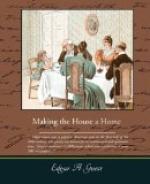The next few months were devoted to preparations for the baby, and our financial reckonings had to be readjusted. I had to find ways of making a little more money. I was not after much money, but I must have more. All I had to sell was what I could write. Where was a quick market for a poor newspaper man’s wares?
My experience with Mr. Dixey turned me to the vaudeville stage. I could write playlets, I thought. So while Mother was busy sewing at nights I devoted myself to writing. And at last the first sketch was finished. At the Temple Theatre that week was the popular character actor, William H. Thompson. To him I showed the manuscript of the sketch, which was called “The Matchmaker.” Mr. Thompson took it on Tuesday; and on Friday he sent word that he wished to see me. Into his dressing-room I went, almost afraid to face him.
“It’s a bully little sketch,” said he, as I sat on his trunk, “and I’d like to buy it from you. I can’t pay as much as I should like; but if you care to let me have it I’ll give you two hundred and fifty dollars—one hundred and fifty dollars now, and the remaining hundred next week.”
I tried to appear indifferent, but the heart of me was almost bursting with excitement. It meant that the furniture bill was as good as paid! And there would be money in the bank for the first time since we were married! The deal was made, and I left the theatre with the largest sum of money I had ever made all at once. Later someone said to me that I was foolish to sell that sketch outright for so little money.
“Foolish!” said I. “That two hundred and fifty dollars looked bigger to me than the promise of a thousand some day in the future!”
Once more the way out had been provided.
And then came the baby—a glorious little girl—and the home had begun to be worth-while. There was a new charm to the walls and halls. The oak table and the green plush settee took on a new glory.
I was the usual proud father, with added variations of my own. One of my pet illusions was that none, save Mother and me, was to be trusted to hold our little one. When others would take her, I stood guard to catch her if in some careless moment they should let her fall.
As she grew older, my collars became finger-marked where her little hands had touched them. We had pictures on our walls, of course, and trinkets on the mantelpiece, and a large glass mirror which had been one of our wedding gifts. These things had become commonplace to us—until the baby began to notice them! Night after night, I would take her in my arms and show her the sheep in one of the pictures, and talk to her about them, and she would coo delightedly. The trinkets on the mantelpiece became dearer to us because she loved to handle them. The home was being sanctified by her presence. We had come into a new realm of happiness.
But a home cannot be builded always on happiness. We were to learn that through bitter experience. We had seen white crepe on other doors, without ever thinking that some day it might flutter on our own. We had witnessed sorrow, but had never suffered it. Our home had welcomed many a gay and smiling visitor; but there was a grim and sinister one to come, against whom no door can be barred.




